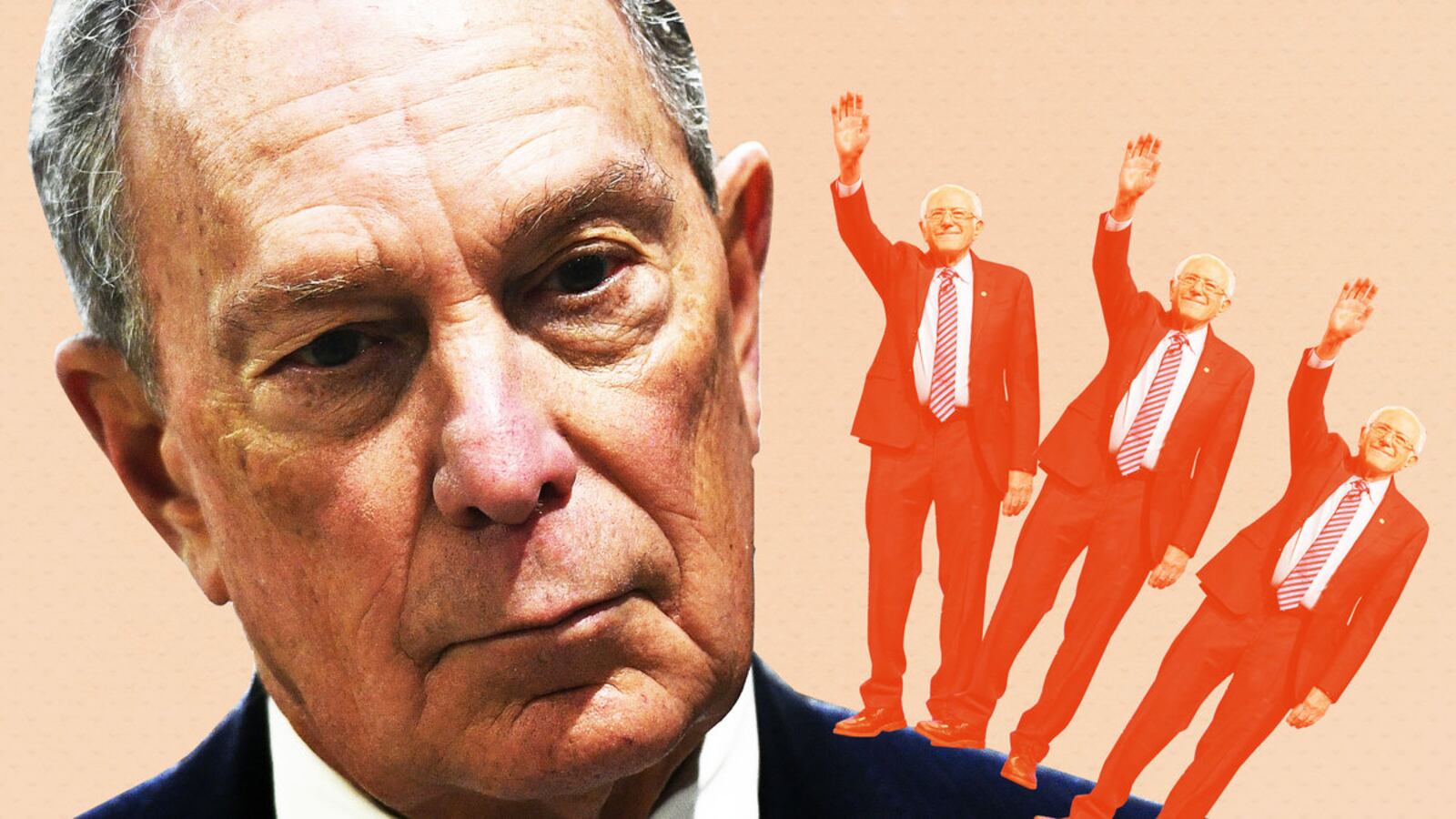If there’s one gift Senator Bernie Sanders (I-VT) may gladly accept from a billionaire, it’s his presence on stage.
Just days before the Nevada caucus, the Vermonter finds himself laying claim to frontrunner status in the Democratic presidential primary, having scored two popular win votes in as many contests. And yet, the focus of Wednesday night’s Las Vegas debate almost certainly won’t be on him. Former New York City Mayor Michael Bloomberg is making his debut on the presidential primary stage, and nearly all of his Democratic rivals seem to be gunning for the chance to nail him while leaving Sanders relatively untouched.
“I don’t think there will be much advantage to try and nuke Bernie up,” former Pennsylvania Gov. Ed Rendell, a surrogate for former Vice President Joe Biden, told The Daily Beast. “Right now the most important battle is who is going to be the last moderate standing against Bernie?”
That Sanders could head into the most important venue before the caucus as a secondary focus reflects the remarkable muddle that has defined the Democratic primary to date. Rival candidates who might argue the frontrunner would be a uniquely bad candidate to run against Donald Trump are now fighting amongst themselves.
Biden, in particular, is in a dire spot. After getting creamed in Iowa and New Hampshire, the campaign is hoping for a stronger showing in the third and most diverse contest yet. Having spent much of the pre-voting primary as the national frontrunner, the former VP is now looking to later calendar dates to revive his campaign from spiraling downward. But the late emergence of Bloomberg, who has risen steadily in recent state and national polls, complicates all of that. And it moves Sanders to the back burner. While several sources in Bidenworld believe Bloomberg poses a big, immediate threat, they see Sanders’ base as loyal and hard to move. Given the opportunity to choose only one target, for now it’s Bloomberg.
“Remember how Joe suffered from Kamala’s attacks?” Rendell recalled about Sen. Kamala Harris’ (D-CA) hit directed at Biden’s record on segregation issues during the first debate in June. “There’s a chance that if Mike doesn't handle the incoming well, he could be seriously slowed.”
That thinking is shared by multiple top party strategies and campaign aides who spoke to The Daily Beast. Having seen him enter the race virtually unvetted, several sources contend that the debate stage is an opportune time to ding Bloomberg on the more unfavorable aspects of his record, including recently surfaced racist and sexist comments he made as the mayor of New York City and in business before that. In one instance in an interview with PBS in 2011, he said there was an “enormous cohort of black and Latino males” who “don’t know how to behave in the workplace.” And he has routinely defended the city’s controversial “stop and frisk” program, which he has since apologized for, but that disproportionately targeted minorities.
In a party that’s largely moved away from corporate donations to grassroots funded campaign operations, being worth $60 billion creates serious political complications on top of that. It also, for many, will prove to be an easy target. Sanders will get a chance to rail against the human embodiment of the extreme wealth that he crusaded against in 2016 and 2020. To that senator, who has said billionaires should not exist, Bloomberg is the equivalent of a pinata.
“Together, we are going to end the greed of the billionaire class,” Sanders tweeted two days before the debate, following up the next day with a targeted message to his supporters in Tacoma, Washington, about working people standing together against the ultra-rich.
Sen. Elizabeth Warren (D-MA)—who is hoping Nevada will turn around her campaign’s trajectory after disappointing third- and fourth-place finishes in Iowa and New Hampshire—has targeted Bloomberg for months. Despite staying relatively quiet on her rivals in the start of her campaign, the Massachusetts Democrat settled on the billionaire as a notable exception. The day he launched his bid, she was drawing a clear contrast, her allies expressing confidence his entrance would serve as the perfect foil for her signature anti-corruption platform and calls for getting corporate money out of politics.
The question heading into Wednesday is whether she will continue those attacks or switch her fire onto Sanders as he lays a stronger claim to the party’s nomination. That the populist frontrunner might escape scrutiny from candidates like her has given several operatives painful flashbacks to the last election.
“In 2016, so many candidates focused on Jeb because of his war chest [that] they missed the opportunity to slow down Trump. When they finally tried, it was too late,” said Michael Starr Hopkins, a Democratic consultant who has worked on several past presidential campaigns. “The same could be true this cycle.”
Others in the field, however, bristle at the idea that attacking Bloomberg means elevating Sanders. One top aide to a rival campaign said there would be time, eventually, to go after both—even if it wasn’t during the 2020 cycle’s ninth debate.
“Everyone is playing to take on Bernie in the spring to summer,” the source said.
But with roughly 40 percent of voters set to cast their ballots on Super Tuesday, when a third of all delegates are allocated, the coming days and weeks may be the last, best shot to slow Sanders’ momentum. And some campaigns do seem to be showing a new sense of urgency. Bloomberg, having intentionally skipped the first four contests, has already invested heavily in many of those states, spending $124 million on ads, according to the Los Angeles Times. His campaign has also increasingly targeted Sanders by name.
Former South Bend Mayor Pete Buttigieg’s campaign, meanwhile, does not talk in an official capacity about debate preparations. But a staffer pointed to the Indiana Democrat’s most recent comments against Sanders, including a denunciation of his “my way or the highway” approach to politics over the past two weeks, as proof that he is still high on his radar. After narrowly winning the delegate count in the Iowa caucus over Sanders, Buttigieg lost the New Hampshire primary to the senator from neighboring Vermont.
But Buttigieg is expected to face more significant hurdles in Nevada. While the Silver State is notoriously hard to poll, two surveys released so far in February have each placed the former mayor in fourth place. A poll by Data for Progress, a left-wing think tank, placed Buttigieg at 15 percent, less than half of Sanders’ 35 percent of support in the survey. The second, conducted by the Las Vegas Review-Journal, detected a similar distance between the two contenders: While Sanders earned 25 percent, Buttigieg was at 10 percent, tied with Sen. Amy Klobuchar (D-MN).
“Klobuchar’s problem is Pete. Pete’s problem is Bernie,” said Philippe Reines, a longtime adviser to Hillary Clinton who played Sanders in her 2016 debate prep sessions.
Still, it’s Bloomberg that Klobuchar has been angling to spar with. Stumping across New Hampshire last week, she telegraphed her desire to go toe-to-toe with the billionaire businessman she has long said is trying to buy his way to the top.
“I know I'm not going to beat him on the air but I can beat him on the debate stage,” Klobuchar frequently says in televised interviews and on the stump in reference to Bloomberg’s massive ad buys, which have totaled some $400 million nationally since he launched his campaign in late November.
One Klobuchar source believes Sanders’ support is less likely to break away from him, a theme picked up in interviews with officials at several top campaigns. While Sanders is indeed the current frontrunner, Bloomberg, who occupies a similarly moderate pathway for the party, is a wild card. And with that question mark comes a chance for all kinds of new attacks.
“Bloomberg’s the one who’s trending and he’s new,” one top national consultant said, referring to Democratic primary voters’ familiarity with his name, but perhaps not much else. “To learn new things about Bloomberg in these next two debates could be really important.”
A new, national NPR/PBS/Marist poll this week showed Bloomberg in second place behind Sanders at 19 percent, while others also indicated he was gaining ground elsewhere. With the increase in momentum, a Bloomberg campaign official said fresh attacks were to be expected.
“It’s not surprising that as Mike continues to rise in the polls, other candidates, including Donald Trump, start to get nervous,” Galia Slayen, a campaign spokeswoman, said. “They’re seeing Mike winning over voters across this country with his record of taking on tough fights and strong case that he is the only candidate to defeat Trump in November.”
Still, not everyone is convinced Bloomberg will be the primary target on stage.
“I’m going to be contrarian and say not everyone is going to go after Bloomberg,” said Reines. “Sanders, yes, because they’re long-term rivals and hitting Bloomberg is consistent with his message. The others have more pressing problems, like stealing votes from each other.”






